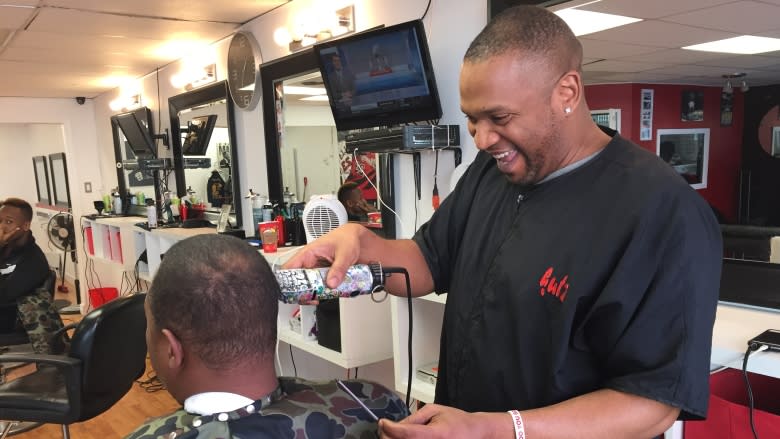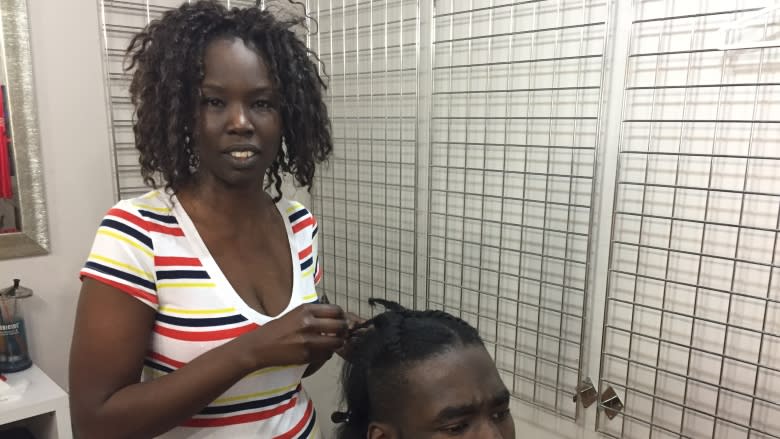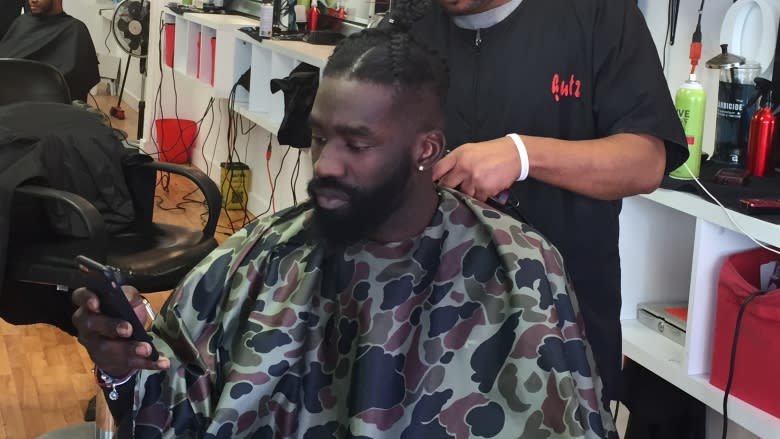This barbershop is the place to talk about racism in London, Ont.
Kwami Lambert's barbershop is known as the place to go for a 'line and fade' but over the buzz of clippers, there is also a lot of debate about racism in a city with a reputation for it.
"We don't talk about the weather in here," Lambert said about the typically heated conversations that happen daily in his downtown London shop. "We talk about the things that matter."
Mostly young black men fill the chairs in United Kutz, each with multiple stories to tell about being approached by police for no apparent reason. More hurtful, and fortunately less common, are the words.
"I was walking down the hallway at Fanshawe College and I was called a slave simply because I am black," Anak Adam recalls focusing intently on the head of hair she is braiding.
The barbershop's front window faces the Covent Garden market where a year ago, a Muslim man was assaulted in an alleged hate crime.
A few blocks away, a black actor visiting London to play the role of Martin Luther King Jr. twice had racial slurs thrown at him, including the the N-word.
"It's upsetting and I want to say something but living in my skin tone, you have to be careful," said Christopher Parker, a recent master's graduate from Western University who was waiting his turn for the barber's chair.
"If I do say something am I being an angry black man? Am I being confrontational? They're going to accuse me of making everything about race."
One of the young men in the barbershop is applying for medical school and refused to join the diversity debate.
Over the shouts from other customers about the need to speak out, he explains quietly that he already feels his skin colour puts him at a disadvantage. Any publicity about his views, he worries, could compromise his chances in medicine.
'The little things'
Others are not shy about talking, especially when it comes to what they call the "little things" that crop up in day-to-day life.
"I went to buy shoes that were marked 50 per cent off but when I got to the counter, I was told the sticker was changed and it it should have read 20 per cent off."
"The cashier looked at me like I was trying to steal the shoes!"
The conversation is rapid-fire, a passionate exchange between people who call London home. United Kutz is not a black-only barbershop, Lambert cautions, but a place where everyone is welcome.
"When I started my business, my friends weren't happy, They were like, why open in London?" the 37yr old barber explains.
"Today, I see a lot more diverse businesses opening and that tells me people are migrating to London and finding hope in the city."
Jordan Lindo, one of the younger customers in the barbershop recently started a new business promoting music and parties. The 26 yr old explains he was inspired after repeatedly being told he wasn't welcome inside at a London nightclub for breaking what he calls arbitrary dress codes. He was wearing a fur vest in the winter, he said.
"My black friends are still being told they can't come into some places in London and no one says anything. People need to speak up."
London's problems with racism are increasingly being talked about with city council loudly calling on the London police force to ban carding, a practice that statistically targets visible minorities.
Work is also underway to develop a diversity and inclusion strategy for the city, one a 200-plus committee of Londoners promise won't get shelved, but will lead to change.
Christopher Parker, now settled in the barber's chair, gets the attention of the room when he touches on one of the major issues the committee is grappling with: hiring practices.
"Ending racism starts with leadership and having diversity at the top." he explains to rousing support.
"Right now, I don't see myself in top positions in this city and until employers take that bold step, not much will change."






